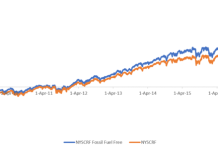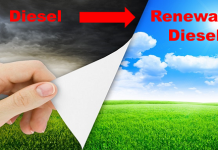Green Energy Investing For Experts, Part III
Tom Konrad, CFA
Controversy continues to grow about the economic viability of shale gas. Investors who doubt the companies’ claims should consider buying puts.
The Case for Gas
From the perspective of a green energy investor, natural gas is the most benign fossil fuel. Natural gas emits less carbon than other fossil fuels (slightly more than half as much as coal, when used for electricity generation.) Natural gas turbines also can quickly compensate for fluctuating supply and demand from other sources of electricity. This quick response makes them a natural complement to variable electricity supply from wind and solar (along with better transmission, electricity storage, and demand response.) Finally, natural gas will be key in making the transition away from fossil fuels, because building relatively cheap gas turbines can provide a bridge to an electric grid dominated by renewable energy, which has a high up-front cost in terms of both dollars and embedded energy.
The Case Against Shale Gas
With all this going for it, why is natural gas part of this series about sectors green investors should consider shorting? (See Part I, which made the case for shorting, and Part II, which looked at shorting Mexico country funds.)
The reasons are twofold:
- I think it would be unwise to short the natural gas industry as a whole… all the reasons laid out above will continue to be strong drivers for natural gas consumption. This article is very specifically about shale gas players.
- There is a good chance (but not a certainty) that shale gas has been oversold.
- The extensive use of fresh water in shale gas development makes shale gas development more environmentally damaging than the less-than benign conventional gas industry.
I wrote a short piece on Art Berman, the leading shale gas critic in October, outlining his views on why decline rates in shale gas wells are likely to be much faster than much of the industry says. I’m no expert on gas, so here are some more authoritative sources for an overview of this controversy: The Financial Times, Art Berman himself, and industry defenders.
Sentiment
Most of this controversy is outside my area of competence. However, that does not mean that it cannot be part of the investment decision process. When making an investment decision, the key question to ask is: Are other investors more likely too optimistic, or too pessimistic about this company or industry?
The shale gas story, which I summarize: "New drilling techniques and discoveries have vastly expanded the available recoverable natural gas, expanding reserves so much that we no longer have to worry about running out, and we will even be able to increase sustainable production over the long term." In other words, it sounds to good to be true. In fact, it sounds like another version of the perennial paean, "Technology will save us," or, in another less pithy variant, "Technology will allow us to continue doing things the way we’ve always done them."
Technology may indeed save us from peaking fossil fuel supplies and climate change, in the sense that it may allow our society to adapt the quick loss of this massively energy intense resource that we’ve been completely reliant on for the last 150 years. However, it is wishful thinking to hope that technology will allow us to keep on doing things the way we’ve been doing them for the last few decades.
Wishful thinking is very seductive, because it allows us to avoid confronting the present reality of our problems today. As such, it’s intensely popular, and I nearly always expect that a large number of investors, spurred on by happy-talk media, will buy it, both figuratively and literally in the form of shale gas company stock (and solar stocks for that matter.)
So, if there is a chance that shale gas companies are over hyping the potential and playing down the risks and costs of their technology, the herd of investors and analysts is most likely underestimating the probability of this chance. I don’t know what the probability is, but I do know that if I can buy insurance against the chance Art Berman is right, the premium for that insurance will probably be low enough to make the deal attractive.
Insurance for Shale Gas
In the stock market, puts are insurance against the chance that the underlying stock will fall below the strike price. If shale gas has been over hyped, the most exposed shale gas players will see large falls in their stock prices when the truth becomes accepted wisdom. If shale gas actually holds as much promise as the companies are saying, such puts will expire worthless, but investor losses will be limited to the price (or "premium") paid for those puts.
In Mexico, I felt a traditional short was the best way to play the country’s exposure to peak oil. Mexico is exposed to a nearly inevitable decline in oil production, which will take a continuing and growing toll on the economy. The only real question with Mexico is how much and how quickly declining oil production will have its effect on the Mexican economy. In contrast, shale gas companies are facing an unknown chance of a catastrophic risk to their entire business model. The question here is not "how much and how fast" but "will it happen and how soon?" In such a case, choosing an out-of the money put is the best way to place a bet. If the chance that shale gas companies’ business models are fatally flawed and will be recognized fairly quickly is higher than is currently implied by market prices, then it makes sense to buy the put.
Which Companies are Most Exposed?
I have not decided if a bet against shale gas is for me, so I have not done an analysis
of which companies are most exposed. Here are the factors to consider if you care to do your own analysis:
- Which companies have the largest exposure to shale gas as a percentage of their business?
- Are there exchange traded puts (LEAPS) available on the company’s stock that expire in 2011 or 2012?
- How liquid are these puts?
- What is the Put/Call ratio of the stock?
We only want to buy puts on companies that have nearly 100% of their business in shale gas. Otherwise, good news in other parts of the company’s business might overwhelm the damage done by bad economics in shale gas plays, and we might not profit even if shale gas turns out to be over hyped.
We also want to make sure that we can buy long term puts, because it often takes longer than skeptics expect for bad news to be recognized in the market.
Most exchange traded options are rather illiquid, meaning that you are either going to pay a high transaction cost in the form of the spread, or you will need to use a limit order and hope that the market moves to you. I tend to prefer the latter tactic, but it means that not all of my intended trades ever execute. A quick measure of liquidity is the spread between the bid and the ask as a percentage of the option price. The smaller the spread, the better.
The Put/Call ratio is a rough measure of the relative demand for downside insurance (puts) compared to upside speculative interest (calls.) Generally, the higher the Put/Call ratio, the more demand there is for downside insurance. Since we are contemplating an essentially contrarian downside bet, we are more likely to be find puts at reasonable prices when the put/call ratio is low, indicating that there is relatively little interest from other investors in buying protection against declines in the stock price.
Company Response
A final sign that a shale gas company may be overstating its reserves is the strength of management’s response to Dr. Berman’s criticism. I feel that a company with little to lose if Dr. Berman is correct will have little incentive to dispute his findings. A company with a lot to lose is more likely to take an active approach to refuting his claims, possibly even taking legal action in the attempt to silence him.
Berman’s top detractors are Devon Energy Corp. (DVN) and Chesapeake (CHK), so those two would also be at the top of my list when considering possible puts.
DISCLOSURE: None.
DISCLAIMER: The information and trades provided here and in the comments are for informational purposes only and are not a solicitation to buy or sell any of these securities. Investing involves substantial risk and you should evaluate your own risk levels before you make any investment. Past results are not an indication of future performance. Please take the time to read the full disclaimer here.






